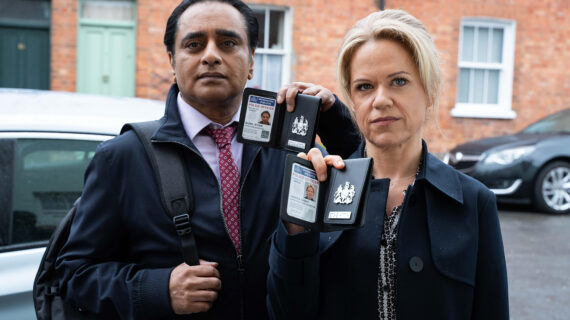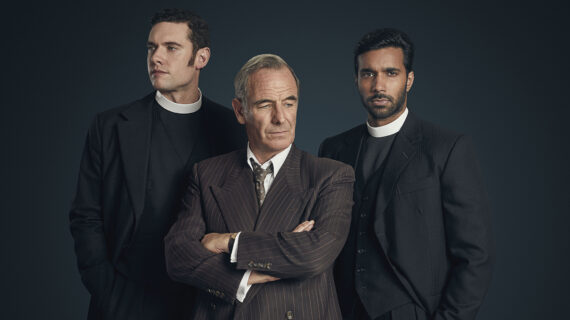Announcer:
The following program is a PBS Wisconsin original production.
Tony Evers:
So tonight I’m declaring 2023 the year of mental health.
Frederica Freyberg:
Governor Tony Evers delivers his State of the State address. Republicans respond. And abortion rights supporters commemorate 50 years since the landmark case of Roe v. Wade.
I’m Frederica Freyberg. Tonight on “Here & Now,” in the year of mental health, a look at how children are faring. Wisconsin food banks ready for an end to expanded Foodshare benefits and the next in our series of interviews with candidates for the state Supreme Court. This week, Janet Protasiewicz. It’s “Here & Now” for January 27.
Announcer:
Funding for “Here & Now” is provided by the Focus Fund for Journalism and Friends of PBS Wisconsin.
Frederica Freyberg:
This week, Governor Tony Evers delivered his fifth State of the State address before the full Legislature, covering a wide range of priorities from mental health and forever chemicals, to tax relief and shared revenue. All of which foreshadow what we can expect to see in his forthcoming budget, for which the governor and the Legislature will have a whopping projected $7.1 billion surplus to work with.
Tony Evers:
We can continue our progress making the wise investments we’ve long needed to do, and not because anyone wants to make government bigger, but because Wisconsinites want a government that works and works better. We have roads and bridges to fix, schools to fund, kids to support, communities to keep safe, water to keep clean and a future we build together after years of neglect that today we must work to protect.
Robin Vos:
Wisconsin Republicans will not raise your taxes, and we won’t pass a budget that doesn’t have significant tax reform. We will not grow the size of government beyond our ability to pay. We will fight to expand choices for parents in every zip code in Wisconsin. We will make sure our neighbors get a hand up and not a permanent handout. And we will invest in our priorities to make sure that government at every level can operate efficiently.
Frederica Freyberg:
In declaring 2023 “the year of mental health,” Evers Tuesday announced spending $270 million to ensure every student has access to mental health services. Because among children, anxiety, depression and suicide reports are up. And a third say they feel sad or hopeless every day. This is according to the Office of Children’s Mental Health. To understand more about student struggles, we turn to Cindy Bourget, an academic counselor at Elk Mound Middle School. She’s been named counselor of the year by the Wisconsin School Counselor Association, and her school has also received the Program of Promise Award for their work with students. She joins us now. And Cindy, thanks very much for being here.
Cindy Bourget:
Of course. Thank you for having me.
Frederica Freyberg:
So how welcome is the attention and potential funding for student mental health?
Cindy Bourget:
It’s very welcome and very needed. We’re very excited that people are starting to pay attention to the needs of our students, and when I say people, our community has always known that our students need support, and it’s just nice to get the validation that everyone is starting to notice that.
Frederica Freyberg:
Because how big is the need and what are you seeing on the ground with your students?
Cindy Bourget:
The need is growing. I would say that the concerns and issues have always been there, but the stressors that the pandemic brought has really brought that spotlight to those needs. So for example, we as school counselors focus on academics, so their achievement. We focus on their attendance and we focus on their behavior. And here in Elk Mound, we have been focusing on absenteeism, because we’ve been seeing an increase of school avoidance and anxiety since going virtual and coming back.
Frederica Freyberg:
And so school avoidance goes to anxiety. How so? I mean, what are students more anxious about?
Cindy Bourget:
And I think we all, as people, have felt that urge when we’re anxious to avoid something. And so students tend to be worried about things like grades. They get worried about things like how they’re going to interact with their friends, but there’s also that added worry of I’m not with my parent, and I’ve been with my parent for the last two years and what’s happening when I’m not with them? And to be quite honest with you, a lot of our students are not able to identify why they’re anxious. It’s just there. And so what we have been doing is focusing on building up the resiliency to be able to overcome that anxiety.
Frederica Freyberg:
How do you build resiliency? What are the steps? What are the tools?
Cindy Bourget:
It’s multifaceted, really. But as the school counselor, the beauty of being able to use data, which we are using absenteeism, like the rates of absences, to be able to identify which students need one on one support and what students need general support. So for me as the school counselor, I do programming with small groups. I do a mighty minds group where we talk about growth mindset. We talk about how to sit in the uncomfortable and how to overcome those feelings of wanting to be away. But my staff has also been wonderful because they have implemented programming in their homerooms so all students are getting instruction on how to deal with anxiety and build the resiliency back.
Frederica Freyberg:
And have you seen a change in either attendance or behavior or overall kind of a sense of well-being amongst the students?
Cindy Bourget:
I would say yes. Our data is showing that our students with the highest rates of absenteeism have gone from 85% of days to 90% of days. So it’s a 5% increase specifically among our highest rates, and then overall, our rates of students feeling connected to their building and their staff has increased 15% as well. So it can really have some significant changes and some significant attitude changes with our students.
Frederica Freyberg:
And how do you bring the families into this kind of mix of wellness?
Cindy Bourget:
You make a wonderful point, because it’s not just the school building where these feelings come from. And everyone in a student’s life is reacting differently to the stress, and that’s kind of the nature of life too, because there’s always going to be stress. So what we’ve been doing with families is teaching them how to support their child when they’re stressed. Quick little things on how to be able to respond when a student doesn’t want to come to school, but also we use a program called Care Solace, where anyone in the district, you don’t have to have a student in the building, you don’t have to work here, can use this service to be able to get connected to outside counseling services so when the problems get too big, we here at the school are connecting you to the resources you need to overcome those issues.
Frederica Freyberg:
Your district also now has, I understand, a mental health coordinator. How meaningful has that been toward helping the school community?
Cindy Bourget:
It has been a game changer, really. Because as school counselors, we’re here to help students within the school day and within the school building with their academics, their attendance and their behavior. But anxiety and mental health doesn’t just affect that. So when we have a student who has been identified as having a higher need, and so what that means is that they’ve been meeting with me pretty consistently. We aren’t seeing improvement in grades or attendance, then it’s maybe time to connect them with some outside services. That’s what our mental health coordinator is able to do. And they’re able to help the family maneuver that system because as we all know, it can be kind of tricky. And so what better way to have the school help than to help them maneuver that process.
Frederica Freyberg:
I do understand that coordinator is a grant-funded position and so if there were any kind of sustainable funding going forward, that would be very welcome as well.
Cindy Bourget:
I would agree. So listening to the State of the State address and all the wonderful opportunities and fundings that we’re being provided are very welcomed and very appreciated, but as you’re working with a student who is with you from K-12, so up to 15 years, being able to have a consistent source of income to make sure that those supports are there their entire school career is really essential. So as we move forward and as we really look at those concerns, considering consistent funding surrounding that would be appreciated.
Frederica Freyberg:
We leave it there. Cindy Bourget, thank you very much.
Cindy Bourget:
Thank you.
Frederica Freyberg:
For 24-hour help, the suicide and crisis lifeline can be reached by calling 988.
In other state news, February will be the last month that people in Wisconsin will receive expanded Foodshare benefits under a federal program that began during the pandemic. Some 400,000 households in the state struggle to afford food and receive Foodshare. Under the formula for income-eligible participants, a household of one person, for example, receives $281 per month in regular Foodshare benefits plus the extra $95, until that extra amount ends March 1st. The Feed My People Foodbank in Eau Claire has already seen increased demand, with 2 1/2 times the number of cars coming to a pop-up distribution site after families were notified that the extra benefits are ending. We go now to their executive director, Suzanne Becker, for more. And thanks very much for being here.
Suzanne Becker:
You bet. I’m happy to be here.
Frederica Freyberg:
So in addition to people trying to prepare for the end of this extra benefit, describe how busy you’ve been over the past several years.
Suzanne Becker:
I can tell you that right now as we’re speaking, we have — we’re doing a distribution and we have a line longer than we have seen since the heart of the pandemic. A lot of folks — and we’ve talked to a lot of these folks and they’re concerned, they’re afraid. The higher Foodshare benefits have been a game changer for many people, not only through the pandemic but also through inflation and the high cost of living right now, so this is going to be very difficult, very difficult on many.
Frederica Freyberg:
And yet that expanded benefit is just a max of $95, but still you say a game changer?
Suzanne Becker:
Oh, yeah. Yes. It has been. And we know that, that seniors and families, working families, it’s just been what they needed to keep paying the bills, to keep providing for their families, and this is going to be difficult.
Frederica Freyberg:
Because what kind of strain have prices of food put on your food bank?
Suzanne Becker:
Yeah, very true. You know, the food supply, when you don’t see food on your grocery shelves, it’s certainly not hitting the food bank. So what it’s caused is food banks across the country to spend a lot more money on purchasing food to make sure that we have enough as opposed to the donated food. And of course that costs a lot of money. And then when we see higher costs, and of course higher gas prices affect our trucks, higher utility costs, all of that affects the food bank as well, but you know, we have to do whatever we can to fill the gap for folks.
Frederica Freyberg:
Have you been able to kind of keep pace with the demand, with all of those things that you were just describing?
Suzanne Becker:
We have. We have. You know, we work through Feeding America, and our community steps up and they have done, you know, tremendous things. We just have to do what we can. We have to continue to do it and, you know, we just hope that folks will come for help. We know that there’s a lot of people out there who have not had to do this before, come to our distribution, or come to a distribution in their community, and we really hope, we really encourage that anybody listening will encourage that they do that. There is help there. We will do what it takes until this — until this — you know, until we’re able to come back to a place that folks can do what they can do.
Frederica Freyberg:
So we know that people are kind of trying to prepare for the end of that extra benefit, but what have folks said to you about how they will weather less of a food budget come March?
Suzanne Becker:
We did a survey not that long ago, and it was based around inflation but it’s the same type of thing, and there was a lot of discussion of, you know, we’re keeping our heat very, very low. That parents are going without so their kids can have what they need. We’re worried about seniors. Seniors is an area of folks that struggle to get to a food pantry, struggle to get out because of transportation, and also there’s such a pride factor with seniors that we feel like we really need to be proactive in trying to reach them. So there’s a lot of ways that people will, you know, figure it out. It just not — you know, it trickles down to our kids. I had a mom tell me that they were doing everything they could to hide it from their kids because they didn’t want their kids to understand that they were struggling, and as a mom of two, that just hurts my heart. We need to — we need to provide the support that they need.
Frederica Freyberg:
In terms of helping seniors who might even be home-bound, are there extra steps being taken there?
Suzanne Becker:
We do work with Meals-on-Wheels, and we provide supplemental food bags to them, and those are meant to be supplemental, just so they have more, and also, you know, because we live in Wisconsin and there’s winter, and so when Meals-on-Wheels can’t deliver, that provides food for them. We have upped that. We have just done a distribution for that and we hope to do another one soon. Wonderful to be able to work with Meals-on-Wheels, who can already identify who those folks are.
Frederica Freyberg:
Absolutely. Well, Suzanne Becker, thank you for your work.
Suzanne Becker:
Thank you. Thank you very much.
Frederica Freyberg:
As the nation and Wisconsin marked the 50-year anniversary of the Roe v. Wade decision this week, we take an opportunity to hear from young people across the state as Dobbs v. Jackson has now reverted abortion law to the states. When asked what issues are most important to them, many young voters said abortion rights.
Ben Fraley:
I think women — a woman’s right to choose, is very important.
Kate Pluta:
By overturning Roe, affluent women will always be able to get abortions. They’ll always be able to get safe abortions. But women in underserved communities, women of color, women who live below the poverty line or just at the poverty line, their lives will be put in danger because they won’t be able to get safe abortions.
Isabela Flores:
It took away our ability to have the say whether we want to be a parent or not.
Makenzie Hobbs:
It almost feels like guns have more rights than women.
Lily Olson:
It’s important to me because as a young girl who still has like the rest of her life ahead of her, knowing that a choice like that has kind of been stripped away, it’s scary. Like knowing that if I couldn’t afford it or if it was like if I got sexually assaulted or something like that, like I would still have to carry the baby. And even if I could die in the process, or if I knew the baby wouldn’t make it, I would still have to have it.
Ashley Butkus:
I think it will cause a lot more negative side effects down the road than what people think.
Frederica Freyberg:
In “Here & Now” 2023 election reporting, the second in our series of interviews with the candidates running in the February 21 primary for the Wisconsin Supreme Court. There are four primary candidates vying for two spots moving to the April 4 general election, two conservatives and two liberals, and whoever wins will determine the ideological balance of the court. Milwaukee County Circuit Judge Janet Protasiewicz is one of the liberals in the race. She was a Milwaukee County assistant district attorney for 26 years before being elected to the Milwaukee County Circuit Court in 2014. Here’s senior political reporter Zac Schultz with Judge Protasiewicz.
Zac Schultz:
What were some of the reasons that made you decide to want to enter the race?
Janet Protasiewicz:
How critically important the race is. And how critically high the stakes in this race are. I was at a pretty comfortable position in my life, quite frankly, and I sat back and started thinking about this race last spring. The more I thought about it, the more I couldn’t sit back and let partisan far right extremists hijack our Supreme Court because everything we care about is on the line. Everything I care about is on the line. I think that everything many, many people care about is on the line. I’ve had contested races. I like to campaign. I like people. The issues are so absolutely critical. I decided to get into the race.
Zac Schultz:
How did you come to the decision on how you would talk to voters about what you care about versus some other candidates in this election who are trying to keep everything pretty plain, talking about the law and the Constitution?
Janet Protasiewicz:
Well, right, and, I mean, I think that we pretty much know how much people care about certain issues. We pretty much know. So my position really is people who are just talking about the Constitution and the law, that’s a personal choice of theirs, I suppose. On the other hand, they may not wish to share what their values or ideas are on some of the issues that are really, really important to voters. So when I talk to voters, I say I can tell you what my values are. I can’t tell you what I will do on any particular case. But I’ll tell you what my values are, I tell you what I think is important. And that’s really how I frame it when I talk to people, because obviously I have to follow the Constitution. Obviously, I have to follow the law. But people are very, very concerned about a wide variety of issues. They’re concerned about women’s right to choose. They’re concerned about fair maps. They’re concerned about community safety. They’re concerned about clean water. They’re concerned about marriage equality. So we talk about those issues in terms of what my values are.
Zac Schultz:
So how do your values then translate to decisions from the bench?
Janet Protasiewicz:
Well, I still have to follow the Constitution. I have to follow the law. But I think we all know that there is a significant ability to interpret the laws, the stare decisis, what has come before us. There’s significant things that can be interpreted in different ways and you can tell that just based on how courts split on their decisions and how there can be a very well-reasoned opinion and a very well-reasoned dissent, right? So you can tell that there are, you know, well-thought-out decisions on both sides, but it’s pretty clear to me, it’s very, very clear to me, that women and men in this state are very, very concerned about a woman’s right to choose. Very, very concerned about it. And so I tell them, you know, you should know my value. You should know my value. And my value is that bottom line is, you know, discuss the issue with your clergy, discuss it with your medical care provider, discuss it with your family or your significant other, but in the end, that decision is really your decision. That’s what my value is. Where would you come down on if a case was brought in front of the court? That’s a separate evaluation.
Zac Schultz:
Along this path towards announcing and running, did anyone say, well, maybe you shouldn’t broadcast those values so loudly. In this kind of campaign, maybe this is — you should code your language a little more so the voters know, with a wink, what you intend but you don’t say it so plainly.
Janet Protasiewicz:
I don’t know why I would do that. I mean, I certainly hear from the far right, she’s telling you what she’s going to do. The criticism is, if she’s telling you what her values are, she’s telling you what she’s going to do. Certainly I’ve heard the criticism. But I think voters want to know. I mean, these issues are really, really on the forefront. They want to know what kind of values a Supreme Court justice is going to bring. So here’s what I say to that. We have had so much extremism, we have had so much of a thumb on the scale, we have had so much where you can kind of predetermine what the outcome of a case is going to be, and that’s just absolutely wrong. You need a Supreme Court justice who’s going to follow the law and uphold the Constitution. That’s what you need. And so you need to, like, let people know what you’re thinking. Common sense and change. We’re trying to get away from all of that extremism and bring common sense and change to our Supreme Court. And that’s really what I keep going back to, common sense and change. And that’s what people want. They’re tired of the dysfunction on the Supreme Court. People tell me that they think the courts should be different, wholly different, than the Legislature and from time to time the executive branch. They should be steps above. They should be places of integrity. And it is so different, the role of the Supreme Court, and the way the Supreme Court distinguishes itself from the legislators and sometimes from, you know, the executive branch. It’s very different. And you want to bring that back. You want to bring back that change, that common sense, that decorum, that dignity, that integrity to the Supreme Court.
Zac Schultz:
When you look at the other candidates running in this primary, obviously I’m sure you would say you are the best choice for voters, but do you think the other candidates are also qualified for the Supreme Court?
Janet Protasiewicz:
I don’t. I think you have two people on the right who are very similarly aligned that are very extreme, that don’t reflect the people in this state. I have a friendly opponent on the left. My opinion is I have longer, broader, deeper experience than he has. So, you know, that’s where I come down.
Zac Schultz:
When you hear from someone like Dan Kelly saying that, well, we can predict how you vote, you’re signaling too much because of where your background is, but he claims that he’s completely independent, and no one will be able to tell, but he’s appeared at Trump rallies. He’s been endorsed by Republicans, he was appointed by a Republican. Is it better to be out and open about where your support is or to pretend that you’re in a lane?
Janet Protasiewicz:
Well, pretending you’re in a lane is so disingenuous. I look at Dan Kelly, he was recently touring the state with, of all people, of all people, Michael Gabelman on an election integrity tour. What were they trying to do? Peddle the big lie that the 2020 election was stolen. We all know that election wasn’t stolen. We know in his last race, he was doing some of, if not all, of his campaigning out of the Republican Party headquarters, right? So, you know, when he made the comments that he made at the forum, they’re quite frankly laughable that those could come out of his mouth with a straight face.
Zac Schultz:
Another opponent in this race is Jennifer Dorow, and she gained fame through appearing as a judge that reached a lot of celebrity status. How much should we put into that, pushing her name recognition forward and rocket-fueling her campaign? Is that what should qualify her for the bench?
Janet Protasiewicz:
No, absolutely not. Now, Darrell Brooks, a very difficult, so to speak, defendant who committed some violent, atrocious crimes, no doubt about it. I’ve told you I’ve spent three years in homicide and sexual assault court, two years with those drug dealers, a year with those domestic violence offenders. Darrell Brooks’ personality is not a unique personality. I’ve seen his personality in court over and over and over with the types of cases that I’ve handled. That’s our job as a judge, to handle that type of personality amongst many others. You know, my house has been under surveillance on numerous occasions because of the types of people that I deal with, because of the death threats that, you know, I have had, you know, that affect myself, my family, my neighborhood. So propelling somebody into running due to one particular case, I think is wholly inappropriate.
Zac Schultz:
What have you felt in terms of the national attention, given this race, and that Wisconsin Supreme Court races used to be relatively sleepy, so to speak, and now we’ve got “New York Times” articles talking about the most important race you haven’t heard of.
Janet Protasiewicz:
Yeah, it’s really interesting. I have to say quite frankly I was surprised, because, you know, I share that assessment. Usually these Supreme Court races are kind of sleepy and it’s a little bit challenging to get out the vote and it a spring election, and in Wisconsin we know that spring election is a primary in February, which is right in the heart of winter. So yes, I was, I would have to say, somewhat surprised by the national attention.
Frederica Freyberg:
Next week on this program, Zac sits down with liberal Supreme Court candidate Judge Everett Mitchell.
For more on this and other issues facing Wisconsin, visit our website at PBSwisconsin.org and then click on the news tab. That’s our program for tonight. I’m Frederica Freyberg. Have a good weekend.
Announcer:
Funding for “Here & Now” is provided by the Focus Fund for Journalism and Friends of PBS Wisconsin.
Search Episodes
Related Stories from PBS Wisconsin's Blog

Donate to sign up. Activate and sign in to Passport. It's that easy to help PBS Wisconsin serve your community through media that educates, inspires, and entertains.
Make your membership gift today
Only for new users: Activate Passport using your code or email address
Already a member?
Look up my account
Need some help? Go to FAQ or visit PBS Passport Help
Need help accessing PBS Wisconsin anywhere?

Online Access | Platform & Device Access | Cable or Satellite Access | Over-The-Air Access
Visit Access Guide
Need help accessing PBS Wisconsin anywhere?

Visit Our
Live TV Access Guide
Online AccessPlatform & Device Access
Cable or Satellite Access
Over-The-Air Access
Visit Access Guide
 Passport
Passport

















Follow Us